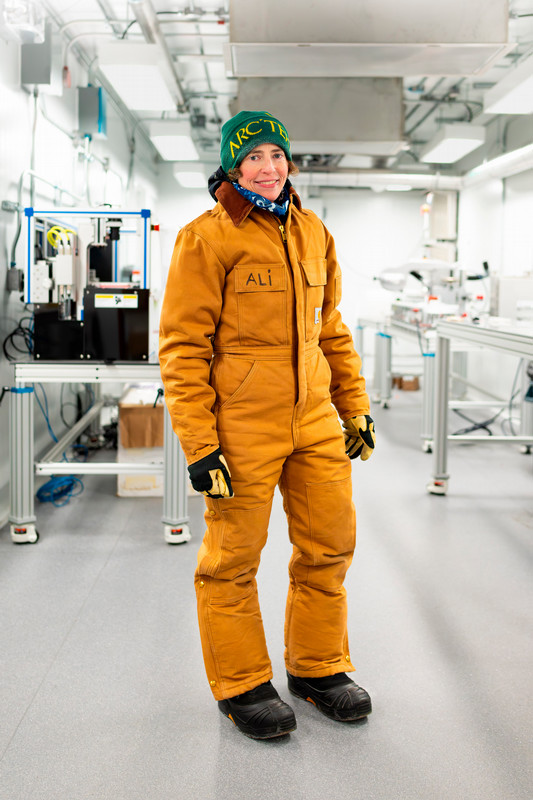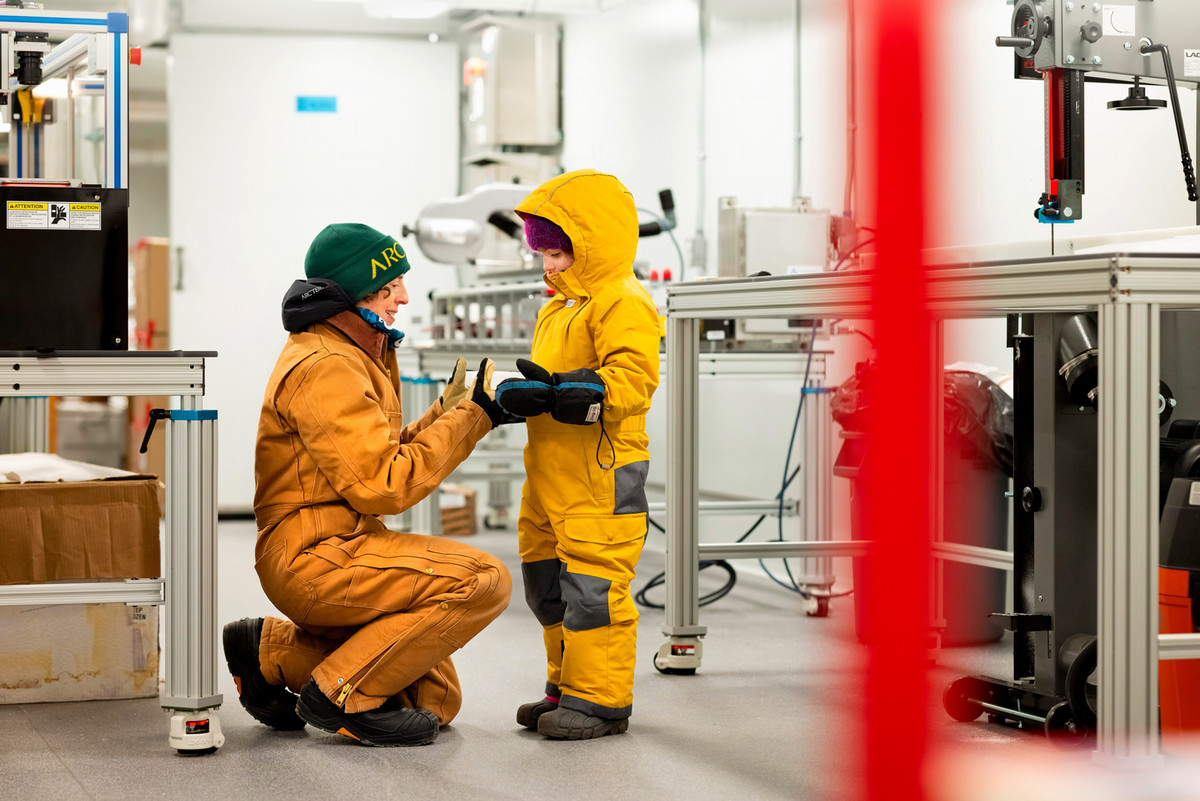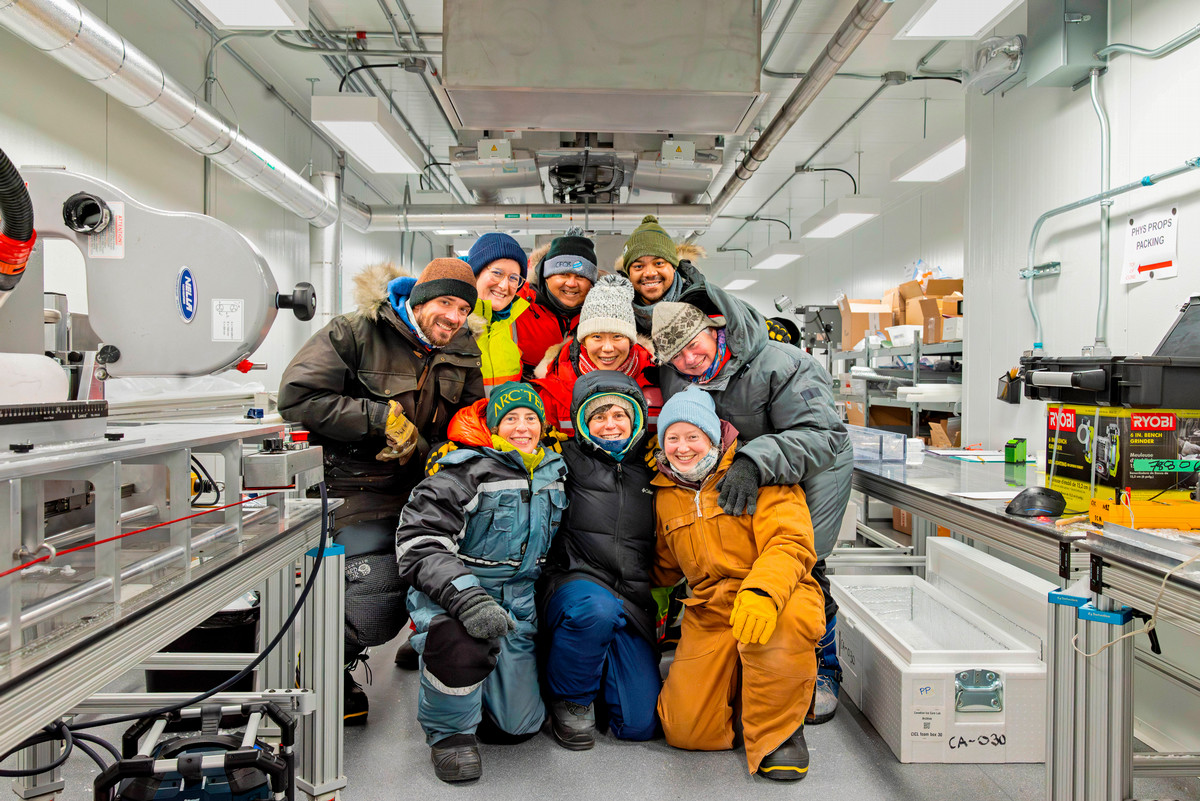In Her Element
Alison Criscitiello has fully embraced life in Canada. She had always been fascinated by glaciers, yet when she arrived in Alberta in 2016 to complete a post-doc, she didn't expect to put down roots. Now an internationally recognized glaciologist and director of the Canadian Ice Core Lab in the Faculty of Science, that investment has been reciprocated many times over, including, earlier this year, with the 2025 Banff Centre Summit of Excellence Award, which she calls the “most meaningful award” she’s ever received.
Criscitiello’s adventurous New England upbringing had given her foundational skills in skiing, ice climbing, and other winter sports, and as a young ice core scientist, the proximity to glaciers in the Canadian North was a powerful draw. More than that, she felt supported by the local mountain community and a scientific funding environment keen to invest in polar exploration — and in her.
“I can say it’s about being in the right place at the right time, but also folks here took a chance on me, and helped me lead this effort,” she says.
“I’m not originally Canadian, though I am now a Canadian citizen, and this is very much a Canadian award from the Canadian mountain community and the Canadian scientific community too,” she says. “The timing feels particularly powerful to me because for many of us, it’s been a difficult year with US scientific funding being pulled back. Whether the message was intended or not, this award is telling me I should keep doing what I’m doing.”
Winter, to no one’s surprise, is Criscitiello’s favourite season, a love that runs so deep it is the name of her daughter (with her wife, Amy). Professionally and personally, the stakes are high. Winter, as a season, may cease to exist as we know it in the not too distant future and polar research — which can tell us so much about the human imprint on the planet — could point us toward sustainable models for planetary stewardship, charting a course to save the season.
In search of these answers, Criscitiello’s research has taken her from Antarctica to one of the most remote locations in the Arctic, the Müller Ice Cap on Axel Heiberg Island, Nunavut,Canada’s second northernmost island. In May, an international research team co-led by Criscitiello and Danish-born, University of Manitoba-based palaeoclimatologist Dorthe Dahl-Jensen extracted the deepest ice core ever drilled in the Americas — reaching 613 metres. By comparison, a cylinder of ice approximately four times the size of the Great Pyramid of Giza was pulled section by section from the frozen ice cap, representing over 10,000 years of Earth and climate history — each piece a measure of the past that may yield profound insights into Earth’s present and future trajectory.
The sections travelled via plane from freezer to freezer, each purpose-built, until they reached Yellowknife where the frozen cargo made its way by freezer truck to its final destination in the Canadian Ice Core Lab at the U of A. This October, the original 10-person team, including the Danish contingent, are assembling at the U of A to begin processing the core and getting it ready for analysis, which Criscitiello says will take six to eight weeks.
Whether drilling in remote areas in temperatures lower than -30C or in the lab, analyzing the chemistry and writing papers, Criscitiello is in her element.
“I can't compare them,” she says. “Part of the reason I love what I do is because it involves both — they complement one another. One is physically difficult and it’s amazing working with international teams on shared goals, but when I’m back here, it’s the same feeling working with my team in the cold lab or the chemistry lab.”
Next spring, Criscitiello will collaborate on a US project in Greenland, a project she is neither leading nor planned, but will be supporting with her operational expertise as a lead driller and with the drilling resources she has built in Canada.
“It’s somewhat unique that I drill my own cores,” she says. “Many ice core scientists have logistical support and engineering companies that do the drilling, and that is the system I grew up with in the States. I wasn’t allowed to touch the drills, but along the way I found people who taught me how to use them, and I love it. With polar research funding temporarily vanishing in the US, Canada has been brought into these huge international collaborations and the Greenland project is an example of this. When they suddenly had no logistics support and no drill, they came to me. I am proud and honoured to be able to support the critical work of others.”
Want to learn more? Take a virtual tour of the Canadian Ice Core Lab at uab.ca/scitours to glimpse our climate past for yourself!
There are new proposals underway, she says, including one she is very excited about on the Columbia Icefield — right in her figurative back yard.
With an international reputation and as an award-winning polar scientist who is frequently in the news, Criscitiello says that young people reach out to her all the time, asking how they can do what she does. It was one of the reasons she was inspired to co-found the Girls On Ice Canada program to empower young women to lead and succeed through science, art and outdoor exploration.
“I believe anyone can do anything they really set their mind to,” she says. “People are in all kinds of different spaces, and whether you are a young woman, whether you're from a small First Nations community and have never left, whether you're queer — none of these things matter. Where I ended up academically was driven first by my love of place. Start from wherever you are.”
The 2025 Banff Centre Summit of Excellence Award will be presented to Alison Criscitiello on opening night of the 50th Anniversary of the 2025 Banff Centre Mountain Film and Book Festival in the Jenny Belzberg Theatre on November 1.
Alison Criscitiello was elected to the Royal Canadian Geographic Society’s College of Fellows and is a Fellow International with The Explorer’s Club. She was recently awarded Queen Elizabeth II’s Platinum Jubilee Medal for her significant contributions to Arctic climate research.


